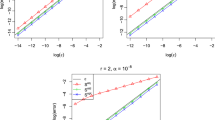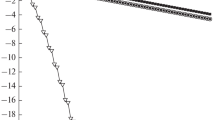Summary
A probabilistic theory for derivation and analysis of error criteria for automatic quadrature is presented. In particular, conditional average error criteria are derived for quadratures which have derivative-bound error estimates. These probabilistic error criteria are compared to variations of heuristic error criteria derived by discretizing the derivative in the original error bound. It is shown that the theory provides a mathematical foundation and a quantitative model for these discrete error criteria. It is also shown that estimating the conditional average error is equivalent to testing error with the spline interpolation as a sample integrand, and that this process can be made implicit by using appropriate error criteria with local error-checks.
Similar content being viewed by others
References
Babuška, I.: Feedback, adaptivity, anda posteriori estimates in finite elements: aims, theory, and experience. In: Babuška, I. (ed.) Accuracy estimates and adaptive refinements in finite element computations, pp. 3–23. New York: Wiley 1986
Babuška, I., Vogelius, M.: Feedback and adaptive finite element solution of one dimensional boundary value problems. Numer. Math.44, 75–102 (1984)
Davis, P.J., Rabinowitz, P.: Methods of numerical integration. Orlando, Florida: Academic Press 1984
de Boor, C.: On writing an automatic integration algorithm. In: Rice J.R. (ed.) Mathematical software, pp. 201–209, New York: Academic Press 1971
de Boor, C.: The quasi-interpolant as a tool in elementary polynomial spline theory. In: Lorentz, G.G. (ed.) Approximation theory, pp. 269–276. New York: Academic Press 1973
de Boor, C.: Splines as linear combinations ofB-splines: a survey. In: Lorentz, G.G., Chui, C.K., Schumaker, L.L. (eds.) Approximation theory II, pp. 1–47. New York: Academic Press 1976
Golumb, M., Weinberger, H.F.: Optimal approximation and error bounds. In: Langer, R.E., (ed.) numerical approximation, pp. 117–190. Madison, Wisconsin: Univ. of Wisconsin Press 1959
Karp, R.M.: The probabilistic analysis of combinatorial optimization algorithms. Proc. International Congress of Mathematicians, Warsaw 1983
Kimeldorf, G.S., Wahba, G.: A correspondence between Bayesian estimation on statistical process and smoothing by splines. Ann. Math. Statist.41, 495–502 (1970)
Kuelbs, J., Larkin, F.M., Williamson, J.A.: Weak probability distributions on reproducing kernel Hilbert spaces. Rocky Mt. J. Math.2, 369–378 (1972)
Kuo, H.H.: Gaussian measures in banach spaces. Lect. Notes. Math. 463. Berlin Heidelberg New York: Springer 1975
Larkin, F.M.: Gaussian measure in Hilbert space and application in numerical analysis. Rocky Mt. J. Math.2, 378–421 (1972)
Lee, D., Wasilkowski, G.W.: Approximation of linear functionals on a Banach space with a Gaussian measure. J. Complexity2, 12–43 (1986)
Li, Y.-S.: Spline function methods (in Chinese). Beijing: Science Press 1979
Parthasarathy, K.R.: Probability measures on metric spaces. New Yokr: Academic Press 1967
Rice, J.R.: A metalgorithm for adaptive quadrature. JACM22, 61–82 (1975)
Sacks, J., Ylvisaker, D.: Statistical designs and integral approximation. In: Proceedings, 12th Biennial Seminar of the Canadian Math. Congress, pp. 115–136 (1970)
Sard, A.: Best approximate integration formulas; best approximation formulas. Am. J. Math.71, 80–91 (1949)
Schumaker, L.L.: Spline functions: Basic theory. New York: Wiley 1981
Shub, M., Smale, S.: Computational complexity: on the geometry of polynomials and a theory of cost; Part II. SIAM J. Comput.15, 145–161 (1986)
Smale, S.: The fundamental theorem of algebra and complexity theory. Bull. Amer. Math. Soc.4, 1–36 (1981)
Smale, S.: On the efficiency of algorithms of analysis. Bull. Amer. Math. Soc.13, 87–121 (1985)
Sul'din, A.V.: Wiener measure and its applications to approximation methods. I, II, Izv. Vyss. Ucebn. Zaved. Mat. 6, 5,13, 18 (Math. Rev. 28#722, 29#1482) 145–158, 165–179, 1960)
Traub, J.F., Wasilkowski, G.W., Woźniakowski, H.: Average case optimality for linear problems. J. TCS29, 1–25 (1984)
Varah, J.M.: On the condition number of local bases for piecewise polynomials, Math. Comput.31, 37–44 (1977)
Wiener, N.: The average value of a functional, Proc. London Math. Soc.22, 454–467 (1924)
Wiener, N.: Cybernetics, or control and communication in the animal and the machine. New York: M.I.T. Press and Wiley 1961
Author information
Authors and Affiliations
Additional information
This paper is based on the author's Ph.D. thesis in computational complexity and numerical analysis, completed at the University of California, Berkeley
Rights and permissions
About this article
Cite this article
Gao, F. A probabilistic theory for error estimation in automatic integration. Numer. Math. 56, 309–329 (1989). https://doi.org/10.1007/BF01396607
Received:
Issue Date:
DOI: https://doi.org/10.1007/BF01396607




